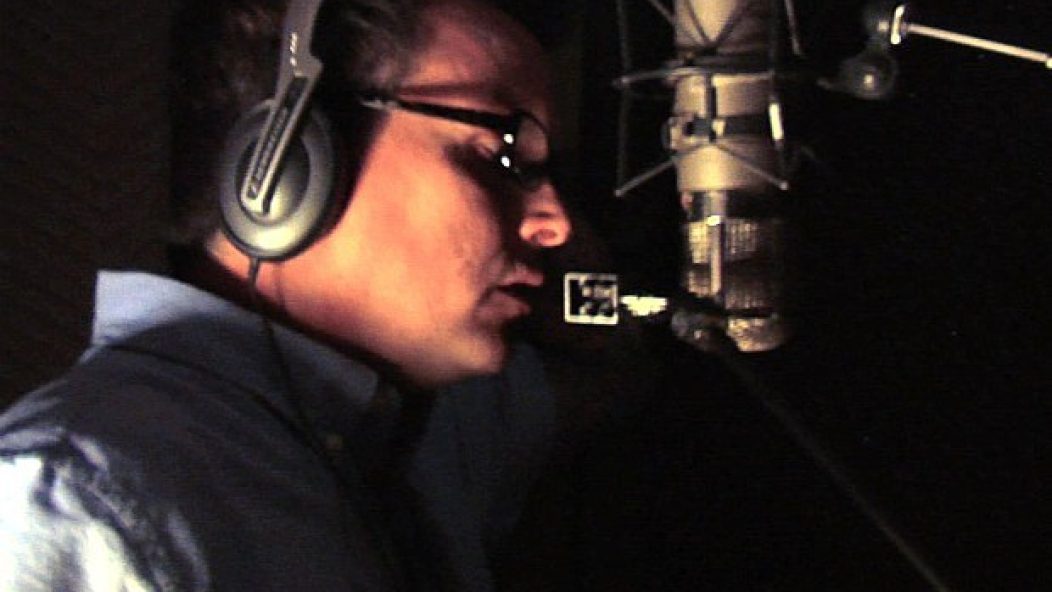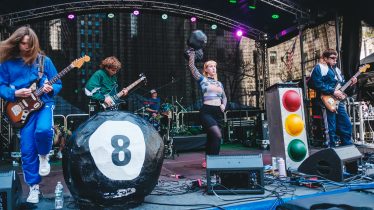
In The Studio: Mighty Mighty Bosstones
In between jaunts to Europe and shows at Boston’s legendary Fenway freakin’ Park, THE MIGHTY MIGHTY BOSSTONES have had a busy summer. Still, very quietly, the ska-punk luminaries have also found time to record a new album. Frontman DICKY BARRETT, who continues to be the announcer for Jimmy Kimmel Live! as well as the gravel-voiced figurehead of the band, tells SCOTT HEISEL all about the record.
There hasn’t really been any sort of social media trumpeting the making of your new album. Did you try to do it clandestinely?
I think a couple of guys in the band have Facebook, a Bosstones Twitter exists that lays fairly dormant [and] there’s a Facebook page for the Bosstones. When it comes to social media, we’re pretty behind the times—not because we’re unable to learn or we’re too old, [but] mostly because we’re disinterested. Somebody told me, it was three years ago, “Oh, you got to get a Facebook page.” And I said, “Why is that?” And they said, “Well, people from your past can get in touch with you.” And then that right there, I made my decision. Absolutely not. There’s a good reason why these people are in my past.
So obviously you haven’t been trumpeting the fact that you have a new record coming out.
I don’t think we ever do that. Other people that would trumpet— ultimately in this day and age, who really gives a shit? Why are we not out there shouting it from mountaintops? It’s never been our style—we show up in your town and we put on our show, which is oftentimes bigger than life, and we make these records. We made one in 2009 that was damn good, and this one is damn good, as well.
I hope it doesn’t go off like I’m bragging; I’m proud of the records and the music we make, and I think we’ve gotten pretty good at it. I enjoy doing it; I’d do it anyway because I like the guys I get to make the music with. Blowing our own horn, which sounds funny when you’re a horn-driven band, has never been really what we do.
Well it sounds like you have a very Teddy Roosevelt approach to it: “Speak softly and carry a big fucking stick.”
That’s what we do, and hey: nicely put. We’ve always kind of done that. I think we are the big sticks of rock ’n’ roll.
This will be your ninth proper full-length, if I’m counting correctly.
I think your numbers are right. I think that’s exactly right and I think nine times, every time we’ve finished the process, we’ve said, “Yes, we’ve done it.” I think if we got to it and album nine wasn’t as good as album eight, I don’t think we’d put it out. I think we’d say, “Are we offering something different?” No matter what—and our fans will disagree and argue and people that love the records we make will say this is the best one or this is the best one and there’s just as many people who tell me Pinpoints And Gin Joints is their favorite record as Devil’s Night Out is their favorite record.
So in your mind, is each new record the quintessential Bosstones record?
I think so, because it’s what we’re doing right this very minute. I think we put the same kind of energy and effort into it we did when we were kids first starting to do it. Throw everything into the bowl and mix it up and hopefully we like how it tastes, and it’s always come out that we have. We finish and we don’t go, “Ooh. We missed the mark on this one.” It’s not like we live off [record sales], so it’s not the kind of thing where we go, “Oh, we made a bad one. Well, we got to release it anyway, the record label has already done a lot of work on it, so it’s got to go out anyway.” That’s not going to happen, so if we did it, we’ll just eat the money that we spent on it and say, “You know what, we ain’t got it anymore.”
Obviously you’re on your own label, Big Rig, so it gives the creative freedom that being on a major label doesn’t provide. Do you think that affects the speed that you work on records? Does it make it faster or slower?
Combination of the two. Yes, and absolutely not. I think we make records the same way we always make records, no matter who’s putting the name on the label. So I think we go in there, we try to make the kind of songs that we like and we would listen to and hopefully the people that like our music will listen to as well. So I never felt anyone breathing down my neck when we were making major label records, and I didn’t feel it when we were making records with SideOneDummy, and I don’t apply that kind of pressure to myself. It’s as corny as this sounds; we consider ourselves to be artists, whether you like our art or not.
Who in the band takes the role as the whip cracker?
I think we’re all pretty damn efficient at this stage of the game. I think if there would be a whip cracker, it would be Joe Gittleman followed closely by me, but only because Joe leads by example. He prides himself on his efficiency, and if it’s time for him to do a background vocal, he runs into it like he runs into a football game. He runs into the booth. He’s an exceptional bass player, and I really think he’s one of the best in rock ’n’ roll. He has his parts down; he knows what he’s going to do exactly. There’s no, “Well, I was going to try this, this and this, and then maybe try this on bass.” He knows exactly what he’s going to do, and if he doesn’t get it in the first take, he’ll get it by the third.
You started working on this new album as soon as Pin Points And Gin Joints was done, using ideas that didn’t necessarily make it on the last one. How do you look at that without referring to those songs as leftovers?
It’s not, really. It’s not so much the song; it’s more the ideas. Musical ideas like that at that stage in time didn’t form a great song, but they were still a seed or a nugget of something that something very fresh, something very new can grow. Fear not, this record is as fresh as yesterday.
Is that ever a challenge? How do you make a record that doesn’t sound like it’s strictly from 2011?
I think that’s production. I think using Ted Hutt as producer helps to keep us younger musically than we probably are. But when you’re making ska-punk music, which is what we did from the very beginning, even in 1995, how fresh can that be? It’s as fresh as you want to put in, it’s as fresh as my lyrics, it’s as fresh as the production itself. So when you’re paying homage and you’re inspired by a music that is at least 10 years old at that time—or maybe even 30 years old, if we’re talking about ska music—then that is a bridge you have to cross every time you make a record. Am I interested in connecting with every 13-year-old kid that plays the Warped Tour? Probably not. Will that kid like it? Pretty sure he will. Are we a brand new baby band? Not by any stretch of the imagination. But are we a band of thoughtful and talented musicians and artists? Yeah, I can say that with much confidence.
(continued on page 2…)

This is the first time you’ve worked with a producer two albums in a row since back in the ’90s when you worked with Paul Kolderie for a couple records. What was the reason for returning to Ted Hutt and not trying to do something different?
We really like the way he works, and we like him as a person. Him and his partner Ryan are both a combination of sensitive and thick-skinned, and that’s the combination of personality that it takes to spend the time with the eight/nine of us. Ted’s a terrific guy, a really talented producer. He’s my age, or a couple years younger than me, and grew up listening to the same type of music. He’s from England originally, so he loves the ’77 punk and the two-tone ska and that kind of stuff. Not only does he like it, he was just old enough to see it when he was a kid.
So it’s very much a kindred spirits kind of thing?
Yeah, for sure. A lot of your modern-day producers aren’t interested in rolling up your sleeves and getting to work. We can’t stand for that kind of low energy or some of these, “Well, we need to be inspired in order to start recording”-type of people in there.
With a band as large as yours, I imagine votes can get split frequently in the studio on certain ideas. How often did Ted have to be that voice of reason?
Ted usually is in on the tie. Ted will usually have an opinion going his way, and ultimately, it’s probably going to be what Ted thinks. If Ted doesn’t like it when it comes down to it, it might not be there. He’s that kind of guy, and that’s what we hired him for is to say not all of our ideas are grand slam home runs. If we’re hitting a double and you don’t want to put it on the record, that’s okay with us. We’re all pretty much on the same page. I value their collective opinions over my singular opinion.
I’m curious as to what lyrical themes you think are going to end up on the record?
Same kinds of things, the same sort of ideas I’ve always had. My observations, my sort of way of looking at life. Songs about what it’s like to be us.
What is it like to be Dicky Barrett?
Absolutely ridiculous. 95 percent foolish and the other five percent is ridiculous. But I will tell you this: I enjoy it. I love being myself and I love being in the Mighty Mighty Bosstones and I love the life that I’ve put together and yeah, the band I get to be in. Would you like the title of the record?
I would love that, yes.
The record is going to be called The Magic Of Youth. Which we felt was fairly comical, but there is a song on the record called “The Magic Of Youth” and it’s being named after that. Other than that, I am telling you no more.
You’re being very cagey. Do you ever feel, when you’re writing all these lyrics, do you ever feel like you’ve run out of things that need to be said?
I feel like I may have. I think the well is dry. I announced that to the guys, and they insisted that I wasn’t and were like, “No, no. We always think you are but no, you’re not.” I was like so specific—at some point how many times can you write “Let’s spill some beer on our plaid suits.” How many different ways can you say that?
Well you could go the whole Sigur Rós way and make up your own language and just sing gibberish.
Who does that?
Sigur Rós. They’re from Iceland, but their singer usually sings in a language he invented called Hopelandic.
Really? Look out. Well then that’s my next record. Should I learn his language? Or should I make my own?
Or you could cover Sigur Rós songs. I think that would go over really well.
I’d like to know the language, and then I will write the songs.
Looking at this new record, is there a certain song that you can pinpoint and say that’s your proudest moment, that you’re most excited to play for people?
No. Our object was to make every single one strong and different and unique and very Bosstones from each other. I hesitate to call what the record actually sounds like because I’m usually wrong, so yeah, it flows. Pin Points is a very ska record, and then other people go, “No, no, it’s a very rock record.” So I don’t know which way it leans or what it is, I know we ended up with 12 songs and all of them feel very, very strong to me. When the songs were played back unmixed, they sounded strong to me. I can remember in the past going, “You have to imagine what it would be like when it’s mixed. Wait a minute, is this song fucked up or bad?” but I never really got that feeling this time. So you’re listening in the past, you ask the producer what’s wrong with this and he goes, “Oh, it needs to be mixed,” and you’d go, “Oh, good.” I didn’t have that feeling this time; there was no imaging. It just felt like these are solid songs and sound really good to me unmixed at this stage of the game. That was a nice feeling.
The songs can only get better from that point.
Yeah, now they’re going to get mixed so I like them in their rawest form. I like them as demos.
Do you think we’ll ever get to hear the demo versions if you like them that much?
No, I hope they get destroyed.
They’re so good that no one can see them?
I do demos and I rarely turn in really bad performances without any kind of energy in them just to make places, but usually when you’re doing demos you’re doing it live so, no, I hope you never get to hear those demos—but who knows in this modern world.
Well, you have to have bonus tunes for iTunes and all that stuff.
No, I will have them destroyed. I don’t know how I can destroy them, but I will. alt








